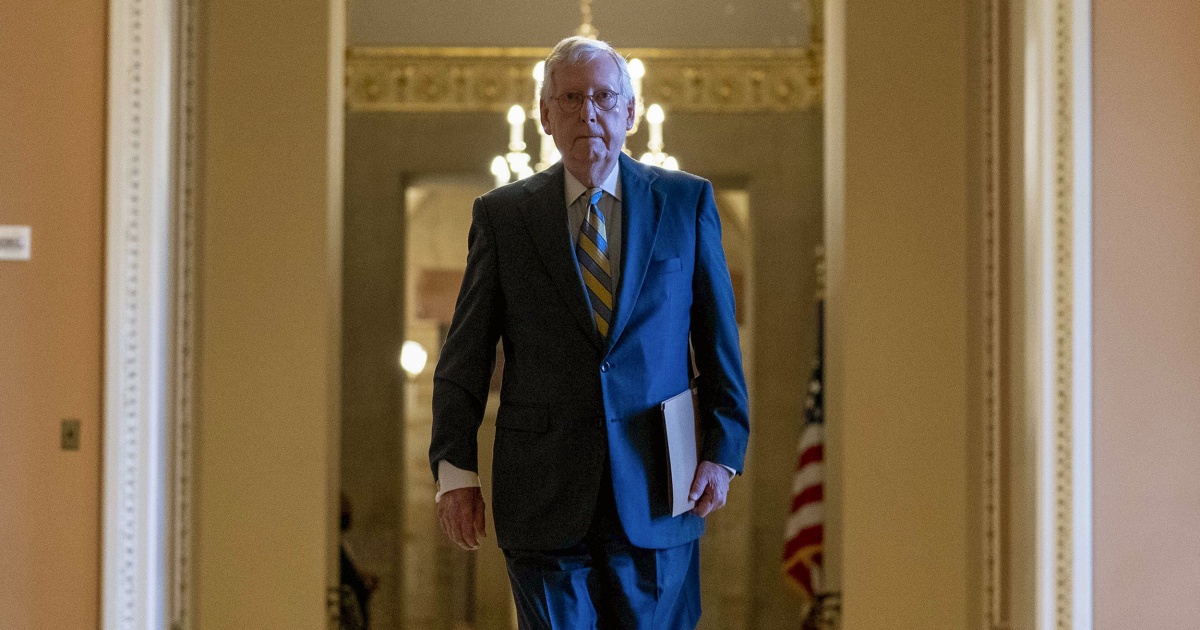
WASHINGTON — Senate Minority Leader Mitch McConnell wanted to save the filibuster. And he did.
For now.
The Kentucky Republican’s late decision to cut a deal on the debt ceiling led just enough Republicans to vote to defeat their own party’s filibuster and enable passage of the bill, which extends the deadline to Dec. 3.
It was a reversal from the monthslong demand that Democrats raise the borrowing limit in their party-line bill of economic and social policies, an ask that Senate Majority Leader Chuck Schumer, D-N.Y., rejected.
According to several senators, McConnell told the caucus that part of the goal was to relieve pressure on Sens. Joe Manchin, D-W.Va., and Kyrsten Sinema, D-Ariz., to abandon their support for the 60-vote rule to avert a calamitous debt default.
McConnell believes that they are the two safeguards to a Senate run on the simple majority.
Still, rank-and-file Republicans questioned the leader’s strategy.
“Republicans are folding here,” Sen. Lindsey Graham, R-S.C., the ranking member of the Budget Committee, said in a rare criticism of McConnell. “This is a complete capitulation.”
“The argument made yesterday was that this may be more pressure than two Democrat senators can stand regarding changing the filibuster rules,” Graham said. “That to me is not a very good reason.”
Before he unveiled his plans to his conference in a weekly closed-door lunch, McConnell met with the two Democratic senators. In that Republican lunch, McConnell told his members that he was trying to protect Manchin and Sinema.
‘Keep democracy alive’
McConnell’s decision was, in part, according to his aides, based on a fear that creating a binary choice between saving the filibuster and saving the economy from a meltdown could break Manchin and Sinema as the U.S. barreled toward the Oct. 18 cliff.
“The reason the Republican leadership took the deal is because Democrats threatened … to nuke the filibuster. And nuking the filibuster would open the door to an even more radical agenda than what the Democrats are teeing up right now,” Sen. Ted Cruz, R-Texas, told NBC News during the vote.
“I understand why leadership did that. I think it was a mistake,” he said. “Unfortunately, Republican leadership blinked in the face of the Democratic threat to nuke the filibuster.”
But the legislation, which is expected to pass the House and be signed by President Joe Biden, is merely a Band-Aid. Congress will have to deal with it again in two months. And the criticism McConnell faced from within his caucus and from former President Donald Trump, the de facto leader of the party, could make it politically tougher to cut a similar deal in December.
After the vote Thursday, Manchin reiterated his opposition to a carve-out for the filibuster for future debt limit increases.
“No. The filibuster is the only thread that we have to keep democracy alive and well in America. It keeps us the body that we are,” he said. “We have to work together. That’s all. If you didn’t have — if we didn’t have the filibuster, to where it can keep us coming back to civility from time to time, then you will see total chaos.”
But many Republicans questioned McConnell’s strategy and were perplexed as to why he backed down.
“I just don’t see where it was in more danger than it has been,” one senior Republican aide said.
But Sen. Lisa Murkowski, R-Alaska, a moderate, defended McConnell’s decision. Asked if it was the right move, she replied, “Yes.” Saving the filibuster, she said, would help “save the institution, save the country.”
‘Brinkmanship did not work’
Around the same time McConnell was pondering his next move, Biden was meeting with CEOs at the White House on Wednesday to mount a pressure campaign, directly calling on McConnell to “get out of the way,” to drop the filibuster so Democrats could lift the debt limit on their own.
Nervousness was growing among business leaders and Wall Street as the deadline neared. Their campaign contributions are a factor heading into the 2022 congressional elections.
McConnell’s aligned super-PAC, Senate Leadership Fund, as well as its anonymous money partner, One Nation, are instrumental in helping Republicans in their elections. SLF raised $475 million in the 2020 election cycle and 95 percent of it was from donors contributing more than $200, according to the nonpartisan donor tracking website OpenSecrets.org.
A Senate Republican leadership aide said McConnell’s decision wasn’t purely about the filibuster, as he also believed that cutting the deal would allow Republicans to focus on criticizing the Democrats’ agenda, as opposed to facing questions about the issue of debt default.
But tensions were palpable even after the vote, when Schumer gave a speech fiercely criticizing Republicans for having “played a dangerous and risky partisan game,” adding: “I am glad that their brinkmanship did not work.”
McConnell, for his part, said the agreement gave Democrats time to use the reconciliation process, which many Democratic senators continued to insist they won’t do — now or later.
“Now there will be no question: They’ll have plenty of time,” he said.
Source: | This article originally belongs to Nbcnews.com










